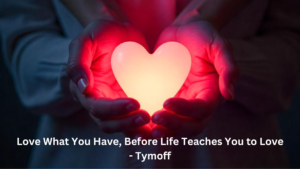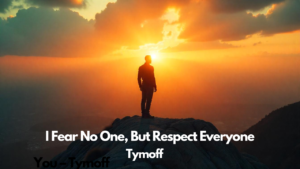Life moves fast, and it’s easy to get caught up in the chaos. Sometimes, the best thing you can do is pause and reflect. The quote “learn to sit back and observe. not everything need – Tymoff” offers a powerful reminder of the importance of mindfulness and restraint.
Many of us feel pressured to react to everything immediately—whether it’s a social media post, a disagreement, or a problem at work. But not everything requires a reaction. There’s great wisdom in staying calm, watching, and learning from situations before making a move.
The Power of Observation: Why It Matters More Than You Think
Observation is not just about looking—it’s about understanding. When you learn to observe without immediately reacting, you begin to see patterns, motives, and details that others miss. This skill is essential for personal growth, strong relationships, and better decision-making.
Taking a step back gives you time to evaluate situations with a clearer mind. When you rush to respond, you’re often acting on emotion instead of logic. That’s when mistakes happen, and misunderstandings arise. Observation helps you avoid these pitfalls by giving you the space to think.
We often underestimate the value of silence. But silence allows others to reveal themselves. Whether it’s a colleague at work or a friend in your circle, giving them room to speak and show their intentions helps you understand them better. That’s how trust is built, and how problems are solved peacefully.
Also Read
Many wise leaders and thinkers are known for their ability to remain silent and observant. They listen more than they speak and watch more than they act. This calm presence gives them an edge. They can see the bigger picture while others get lost in the noise.
Sometimes, doing nothing is the most powerful response. When faced with negativity or manipulation, reacting can fuel the fire. But staying calm and observing can take the power away from those trying to disturb your peace.
Practical Benefits of Sitting Back and Observing
Here are some real-life advantages of practicing observation:
- Improved Relationships: You learn to understand others before judging them.
- Better Decisions: You think through consequences instead of rushing into actions.
- Reduced Stress: You avoid unnecessary drama and emotional energy drain.
- Stronger Leadership: Observant people are often more respected and trusted.
Let’s look at a comparison of how people who react quickly differ from those who observe first:
| Behavior Type | Quick Reactors | Observers |
|---|---|---|
| Communication | Impulsive and emotional | Calm and thoughtful |
| Decision-Making | Rushed, sometimes regretful | Strategic and calculated |
| Relationships | Prone to misunderstandings | Better empathy and understanding |
| Leadership Style | Aggressive or erratic | Wise and balanced |
| Emotional Control | Easily triggered | Maintains composure |
Learning to sit back and observe doesn’t mean you’re ignoring things. It means you’re choosing to respond with clarity instead of impulse.
Not Everything Needs a Reaction: Emotional Discipline in a Loud World

We live in an age of instant responses. Social media, text messages, emails—all push us to answer fast. But not everything deserves your time and energy. When you constantly react, you become emotionally drained and mentally exhausted.
This is where the second part of Tymoff’s quote becomes important: “not everything need.” While the grammar is stylistically clipped, the message is powerful. Not everything needs your reaction, opinion, or involvement.
You are not obligated to respond to every message, fix every problem, or prove every point. Sometimes, peace is more valuable than being right. You don’t need to jump into every argument or explain yourself to everyone.
Emotional discipline is the ability to pause. It helps you stay in control instead of letting others pull you into their storm. People often try to provoke a reaction from you—especially when they feel insecure or challenged. Choosing silence is a form of strength.
Here’s how you can strengthen emotional discipline in your everyday life:
- Pause Before Responding: Count to five before reacting to a trigger.
- Ask Yourself If It’s Worth It: Will this matter in a day, week, or year?
- Set Boundaries: Learn to say no and protect your mental space.
- Practice Mindful Breathing: Deep breaths help calm the nervous system.
Learning the Tymoff Way: Building a Life of Peace and Self-Mastery
The phrase “learn to sit back and observe. not everything need – Tymoff” is more than a quote—it’s a mindset. It teaches you to value peace, inner strength, and thoughtful living. In a world full of noise, mastering silence is a superpower.
Self-mastery begins with awareness. You have to notice your triggers and learn how to deal with them. The first reaction is often emotional. But the second thought is usually wiser. That’s why it’s important to delay reactions and give yourself space.
Your response to difficult people or situations says more about you than them. If you choose calmness over chaos, you become a person who is hard to provoke. That’s power. That’s growth.
How to Develop the Observer’s Mindset
Adopting Tymoff’s philosophy into your daily routine can change your life. Here’s how you can start:
- Start Journaling: Reflect on your day and what you learned from quiet observation.
- Limit Exposure to Noise: Reduce time spent on things that trigger unnecessary reactions.
- Read and Listen More: Absorb knowledge before forming strong opinions.
- Practice Gratitude: Appreciating what you have builds patience and perspective.
Also, here’s a quick checklist to help you practice observation:
| Habit | Description | Frequency |
|---|---|---|
| Morning Reflection | Sit in silence and set your intention for the day | Daily |
| Situation Journal | Write about what happened and what you observed | Daily |
| Emotional Check-in | Ask yourself how you feel before reacting | Every trigger |
| Response Delay Practice | Wait before replying to non-urgent messages | Ongoing |
Consistency is key. Over time, your mind becomes calmer, and your reactions become wiser.
Final Thoughts
There’s a reason the wisest people speak the least. They understand that every reaction has a cost. They pick their battles, protect their peace, and choose silence when words aren’t needed.
“Learn to sit back and observe. not everything need – Tymoff” is a reminder to value your energy. Life isn’t about being everywhere or responding to everything. It’s about choosing where to be and what truly deserves your attention.
You don’t need to fix every misunderstanding, respond to every opinion, or prove your worth to anyone. Observe more, react less, and you’ll find more clarity, strength, and peace than you ever imagined. If this mindset resonates with you, you’ll also appreciate the reminder to love what you have, before life teaches you to lov – tymoff—a message that goes hand-in-hand with the power of observation and gratitude.




